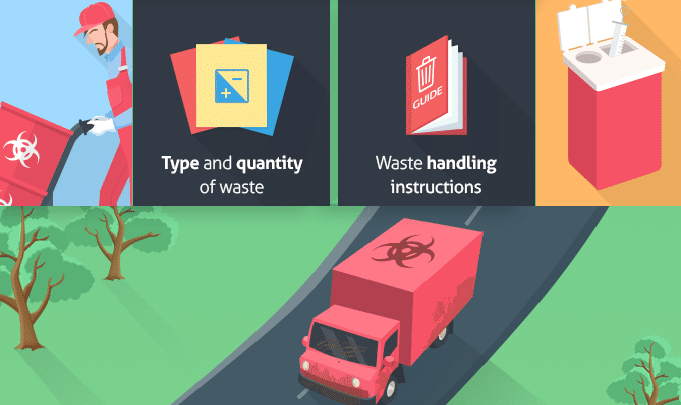Waste is the one thing the world will always have. As human beings, we collectively produce tons of waste every single day. From your everyday household waste, biohazardous waste produced by large industries, medical waste produced by the healthcare industry, infectious waste, retail waste, electronic waste, the list is endless. In terms of food waste alone, Wired Magazine reports that Americans throw away as much as half of the food they eat.
It's not a surprise then that waste disposal is a billion-dollar industry because, let's face it, with all the waste we produce, someone's gotta take out the trash. And it's not just as simple as taking it out but to properly dispose of it to ensure that the waste we produce isn't harmful to our environment.
You don't normally think about it, but every single piece of waste you produce should be disposed of in the right way. For example, if you happen to have extra cans of paint at home, you can't simply throw them in the trash bin and that's that - nope. Your extra cans of paint are classified as hazardous waste and to throw it away, you will need to schedule an appointment at your nearest hazardous waste disposal center, drop it off and they will then take care of properly disposing it.
If that's the process you need to go through to dispose of hazardous household waste, imagine what it's like for medical waste? In your local hospitals and health care centers alone, you can only imagine the amount of infectious medical waste they produce daily. To dispose this waste, the right infectious waste management methods must be practiced and it takes specialized medical waste management services to properly dispose of it in compliance with the standards and regulations stipulated by the state.
And that's how it becomes a real money-maker - there are plenty of business opportunities for you in the medical waste industry.
And if you're thinking that only hospitals produce this type of waste, you can think again. According to Chron.com, if you're willing to comply with all the regulatory requirements and invest in all the necessary tools and machinery, you can provide waste disposal services to "medical, dental and veterinary practices, as well as outpatient surgical centers and hospitals". In fact, you can contract many other establishments that produce medical waste like pharmaceutical companies, laboratories, private practices, even prisons; virtually any place that produce infectious medical waste can become your potential client.
If you're interested in tapping the gold mine of business opportunities that is the medical waste industry or if you already have your own waste disposal cleaning and are looking into expanding, you might want to go ahead and read the six simple tips and resources that we've narrowed down to help you jump start your own medical waste disposal services company:
1. Don't be afraid to start small.
Start small, work hard, dream big - come out strong. That's every small business owner's mantra. But that's exactly what Taylor Chunn did. A recipient of this year's Waste 360 40 Under 40 awards program "which recognizes inspiring and innovative professionals under the age of 40 whose work in the waste, recycling and organics industry has made a significant contribution to the industry."
From literally banging on doors and handing out business cards, Taylor Chunn is now the CEO and president of Medical Waste Management, a medical waste disposal firm based in New Orleans that handles a whopping 2 million pounds of waste each year.
2. Comply with all your state's medical waste disposal standards, rules and regulations.
The waste disposal industry is heavily regulated - and for obvious reasons. Waste handling, management and disposal can be a very delicate and tedious process. Every safety precaution must be met in order to keep you, your staff and the environment safe. That's why complying with state regulations is a must. As a result of all these regulations, being regularly audited is inevitable. To avoid hefty fees, you must always be compliant.
To start with, you can take a look at the website of the US Environmental Protection Agency. The EPA's site is a great resource for looking into everything you need to know about waste regulations. You can also look for legitimate websites such as medicalwasteregulations.com where you can search for medical regulations for each state.
Chron.com also offers basic rules on how to start your own medical waste disposal company.
3. Invest in proper facilities and transportation services
"Picking up trash" is one of the most basic functions of a waste disposal services company. Of course, with the exception of infectious waste or disposal of sharps, where there will be times when you would need to drop it off in the certified waste disposal centers, your main job function as waste disposal services is to physically pick up the biohazardous waste from various establishments.
Head over to the Department of Environmental Conservation's website to give you complete and detailed information on regulated biohazardous waste treatment, storage, containment, transport and disposal.
4. Most importantly, invest in the right people
Unlike other small business where you can be the operations manager, staff supervisor, HR and all other functions all in one, a medical waste business needs properly trained staff. You can start with a handful of people with basic job functions but investing in people with the right training, certifications, etc. is vital to assure your success in this industry.
There you have it - simple and practical tips to start your own medical waste business. We know that it's not easy to get everything started but with the right mindset, the right resources and of course, hard work, making money from medical waste is a great opportunity.
By
Craig Spelch
